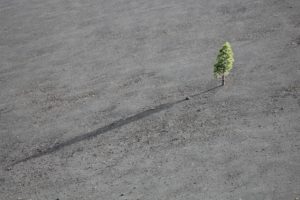
Eighty percent of Jesus’ recorded miracles are healings, so you’d think the Gospels would include at least a few of those people’s names—like Peter’s mother-in-law. But, resurrections aside, the Gospels record the name of only one person Jesus healed.
Bartimaeus.
Why him? And why does his story appear in three of the four Gospels? (Matthew 20:29-34; Mark 10:46-52; Luke 18:35-43)
His story is an exclamation point to what comes before it.
Mark makes his point
Before talking about Bartimaeus, Mark spends forty-five verses showing five examples of Jesus dispelling mistaken notions of what it means to follow Him. Like the rich young ruler who thinks he’s a Christ follower (vss 17–31). James and John learn they can’t reserve a favored seat in heaven (vss 35–45). And so on. Notably, Jesus can’t winnow the Pharisees’ wrong ideas. They don’t feel they need to be saved. And they’re laser-focused on tricking Jesus into violating the Law so they can arrest Him.
Then we come to Bartimaeus. Blind, begging on the side of the road near Jericho, he hears Jesus is in the vicinity. He can’t tell where Jesus is; so, at the risk of making a fool of himself, he shouts, ““Jesus, Son of David, have mercy on me!” Of course the people nearby tell him to stop his embarrassing outburst. They don’t want to be associated with him to begin with; they just want to get a glimpse of Jesus.
Instead of falling silent, Bartimaeus shouts louder and longer.
Notice what Jesus doesn’t do. He doesn’t walk up to Bartimaeus. Instead, He has the blind man come to Him. Without hesitation, Bartimaeus somehow finds his way to Jesus.
The moment Jesus says, “Go; your faith has healed you,” Bartimaeus has the freedom to go wherever he pleases. But instead, he immediately follows Jesus along the road (Mark 10:52, emphasis mine). With no regard for what he’d leave behind, Bartimaeus closes the distance between his past life and life with Jesus.
Closing the distance between you and Jesus
That’s what Jesus calls us to do: close that final distance between us and Him. Truly come to Him. And follow Him.
Unfortunately, many people never traverse that distance. They may warm church pews or sit on church committees. They hold Jesus at arm’s length instead of selling out to Him. Jesus at a distance is safe. It keeps the relationship on human terms instead of His.
Jesus makes it clear we’ll never enjoy the intimate relationship God has intended for us since the beginning of time if we hold Him at arm’s length.
That’s the point of the five stories preceding this one in Mark 10. In each case, people tried to restrain or constrain their relationship with Jesus. They cherry-picked what they wanted from the relationship: good deeds instead of godliness, lawful legalism instead of humble surrender, passing near instead of believing in.
In other words, they fell short of being a disciple.
Admiring versus following Jesus
Think about the people who waited in the heat by a dusty road for who-knows-how-long to catch a glimpse of Jesus. That late in His earthly ministry, they were more than curious. They admired Him.
It’s easy to admire Jesus without following Him. It costs nothing. Knowledge about Jesus doesn’t equal knowing Him. Following Jesus costs us everything—including our pride in thinking we can navigate life successfully on our own.
Mark records that Bartimaeus cast aside his cloak to follow Jesus. That likely was his most valued possession. A cloak could serve as a coat, pillow, blanket, bundle for belongings, and the means to catch coins tossed his way. In practical ways, it protected him and what he valued. But losing his cloak paled in comparison to what Bartimaeus gained physically and spiritually.
Bartimaeus was so ready and willing to identify with Jesus that he was immediately named as one of Jesus’ disciples: “And immediately he received his sight and followed Jesus along the road” (Mark 10:52 BSB, emphasis mine). The Greek word used here doesn’t mean tag along; it means join as a disciple and cleave steadfastly to that person.
An uphill road
The road Bartimaeus walked with Jesus was tough: eighteen miles, all uphill, from Jericho to Jerusalem. Jericho lay 850 feet below sea level; Jerusalem soared 2,500 feet above sea level. Mountains made the trail tortuous and treacherous. Moreover, In a little more than one week, Bartimaeus witnessed Jesus’ triumphal entry into Jerusalem, His crucifixion, and resurrection. What a physical and spiritual baptism of fire for the new disciple!
Following Jesus looks different for everyone, but we can be certain of two things: it will involve challenges, and He will walk every step of it with us.
Father God, please show us through your gentle Holy Spirit any distance we’ve put between ourselves and You. We don’t want to miss a thing You have planned for us. May we be like Bartimaeus in being willing, without reservation, to go and do whatever You want us to. To Your praise and glory, amen.
Never miss a post!
************************************
BONUS:
Two footnotes to this story
The writer in me sees two delicious mysteries in Bartimaeus’s story.
- First, his name.
It’s a mix of an Aramaic and Greek word that means “son of Timaeus,” which means “son of honor.” But Mark already identifies him as that; so why repeat it? Change one letter in the spelling and his name means “son of uncleanness”—which alludes to his misfortune. - Second, the verb used to describe his begging.
We don’t know how he went blind or how long he’d been blind. But the verb that describes his begging is used only once in the New Testament—here. It implies begging for a specific purpose and a structured code of conduct for doing so. Did he get blinded in an accident? Did his family turn against him when he couldn’t provide for them? I haven’t dug into that further, but maybe Bartimaeus was like many of us (especially post-COVID) who’ve been hit hard with financial difficulties through no fault of our own. Even so, physical and material circumstances have a spiritual side to them.
For a deeper dive, click here.
Whatever had come before, Jesus’ healing of Bartimaeus resulted in his complete submission to Christ, regardless of what was ahead. (Try this on for size: read Mark 10:46–52 and substitute your name for Bartimaeus.)





Hi Lana,
I loved this post! It really made me think … who AM I like?
I’m going to read those verses again.
Thanks,
Amy
Bless you, Amy! Praying God will give you insight and encouragement from doing so!